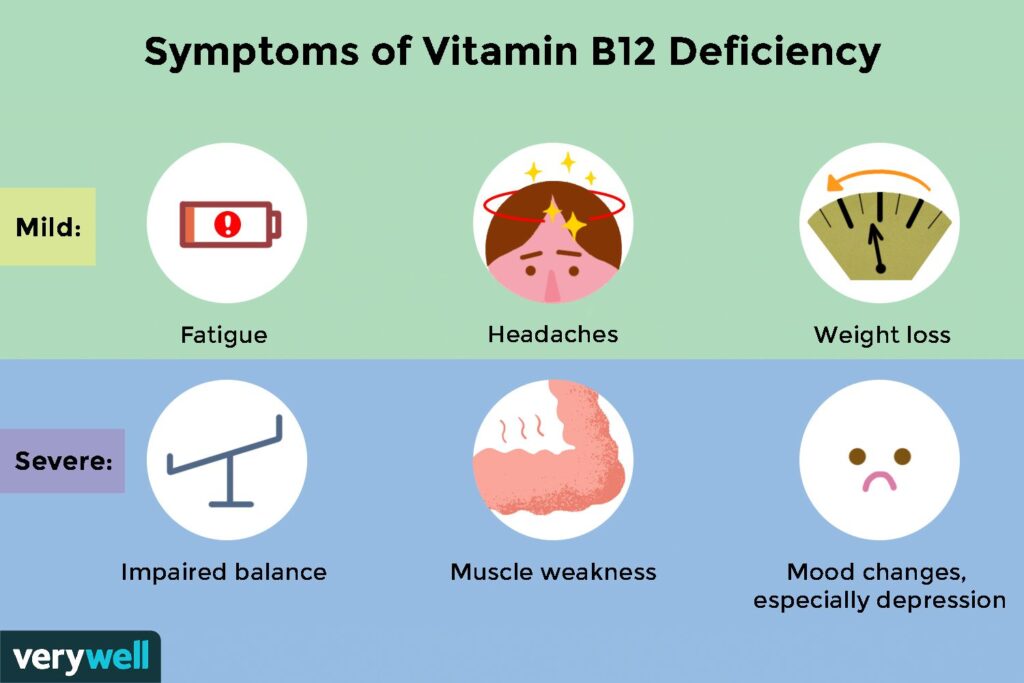Vitamin B12 deficiency, a widespread yet often overlooked condition, can lead to serious neurological, hematological, and psychological complications if left untreated. Vitamin B12, or cobalamin, is a water-soluble vitamin essential for DNA synthesis, red blood cell production, and maintaining healthy nerve cells. The deficiency often progresses silently, making early recognition and intervention critical.

The Biological Role of Vitamin B12 in the Human Body
Vitamin B12 serves crucial functions in maintaining optimal bodily health:
- Red Blood Cell Formation: Supports production of healthy red blood cells, preventing megaloblastic anemia.
- Neurological Function: Essential for myelin sheath synthesis, protecting nerve fibers.
- DNA Synthesis: Integral to the creation of genetic material during cell division.
- Energy Production: Helps convert carbohydrates into glucose, contributing to overall energy metabolism.
Common Risk Groups:
- Vegans and vegetarians
- Elderly individuals with reduced gastric acid
- Patients with gastrointestinal disorders (e.g., Crohn’s disease, celiac disease)
- Post-bariatric surgery patients
- Long-term users of antacids and diabetes medications
Symptoms of Vitamin B12 Deficiency
Symptoms of vitamin B12 deficiency can vary in severity and presentation, often mimicking other disorders.
Hematologic Symptoms:
- Fatigue
- Pallor
- Shortness of breath
- Heart palpitations
Neurological Symptoms:
- Numbness and tingling in hands and feet
- Muscle weakness
- Balance issues
- Cognitive disturbances such as memory loss and confusion
Psychiatric Symptoms:
- Depression
- Irritability
- Psychosis in severe cases
Gastrointestinal Symptoms:
- Glossitis (swollen, inflamed tongue)
- Appetite loss
- Weight loss
- Diarrhea or constipation
Diagnosis of Vitamin B12 Deficiency
Timely diagnosis requires a combination of clinical assessment and laboratory testing.
Diagnostic Methods:
- Serum Vitamin B12 Levels: Levels below 200 pg/mL are generally considered deficient.
- Methylmalonic Acid (MMA) and Homocysteine: Elevated levels are more specific markers of functional B12 deficiency.
- Complete Blood Count (CBC): Macrocytic anemia with high mean corpuscular volume (MCV).
- Peripheral Blood Smear: May show megaloblastic cells and hypersegmented neutrophils.
- Intrinsic Factor Antibodies: To diagnose pernicious anemia.
Complications of Untreated B12 Deficiency
Without intervention, vitamin B12 deficiency can lead to:
- Pernicious Anemia: An autoimmune condition leading to impaired absorption of B12.
- Irreversible Neuropathy: Permanent nerve damage and balance disorders.
- Cognitive Impairment: Including dementia-like symptoms and mood disturbances.
- Infertility and Pregnancy Complications: Including neural tube defects and preterm birth.
- Cardiovascular Risks: Due to elevated homocysteine levels.
Treatment Options for Vitamin B12 Deficiency
Treatment is based on the underlying cause and severity of the deficiency.
Oral Supplementation:
- Suitable for dietary deficiencies
- Dosage ranges from 1,000–2,000 mcg/day
Intramuscular Injections:
- Preferred for malabsorption and pernicious anemia
- Typical regimen: 1,000 mcg IM daily for 1 week, then weekly for 4 weeks, then monthly for life
Nasal Gels and Sublingual Tablets:
- Effective in mild-to-moderate deficiency when injections are not feasible
Preventive Measures for Vitamin B12 Deficiency
Proactive prevention strategies include:
Nutritional Strategies:
- Incorporate B12-rich foods such as:
- Animal liver and kidneys
- Beef and poultry
- Shellfish (clams, tuna, trout)
- Dairy products and eggs
- Fortified plant-based milks and cereals
Supplementation:
- Recommended for:
- Strict vegans
- Pregnant and breastfeeding women
- Individuals over 60 years of age
Routine Screening:
- Especially for individuals with chronic conditions, gastrointestinal surgeries, or prolonged medication use
Foods Rich in Vitamin B12
| Food Item | Vitamin B12 Content (µg per 100g) |
|---|---|
| Beef Liver | 83.1 |
| Clams | 98.9 |
| Tuna | 9.4 |
| Fortified Cereals | 6.0–15.0 |
| Eggs | 1.1 |
| Milk (whole) | 0.9 |
| Nutritional Yeast | 17.6 (fortified) |
Vitamin B12 and Pregnancy
Vitamin B12 plays a vital role during pregnancy and lactation. Deficiency during this time can result in:
- Neural tube defects
- Developmental delays
- Anemia in both mother and infant
- Low birth weight
Regular screening and appropriate supplementation are crucial to maternal and neonatal health.
Public Health Approaches and Awareness
Global health authorities, including the World Health Organization (WHO) and National Institutes of Health (NIH), advocate for increased awareness and food fortification to address B12 deficiency, particularly in vulnerable populations.
Programs focusing on:
- Nutritional education
- Screening in primary healthcare
- Accessibility to supplements
are instrumental in reducing deficiency rates and their associated burden on healthcare systems.
Vitamin B12 deficiency is a silent yet critical nutritional disorder with profound health implications. Early identification, accurate diagnosis, and targeted treatment are essential to prevent irreversible damage. With growing awareness, proper dietary choices, and appropriate supplementation, vitamin B12 deficiency can be effectively managed and prevented.

